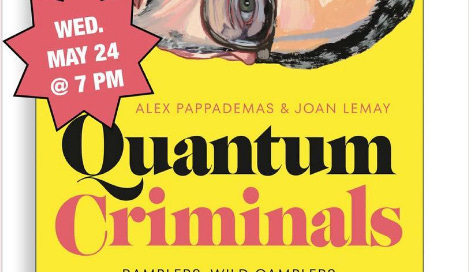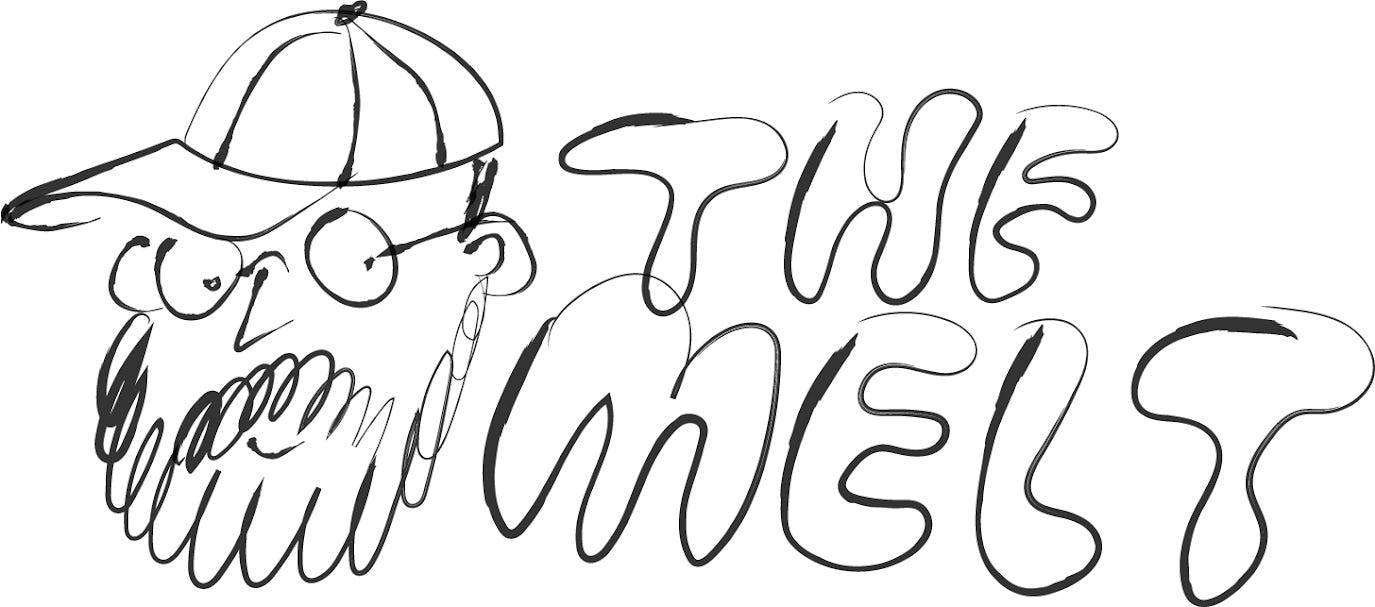
Discover more from The Melt by Jason Diamond
Today marks the release of Quantum Criminals: Ramblers, Wild Gamblers, and Other Sole Survivors from the Songs of Steely Dan, the wonderful new book by Alex Pappademas and Joan LeMay that I’m not going to dive that deep into since I’ll be talking with them live, in person, out in the lovely Unnamable Books backyard tomorrow evening, May 24th. All I’ll say is I don’t really feel the need to pick up many books about musicians from the 1970s, because they all often come off as self-serving and/or just regurgitated lore I can read about on Wikipedia or I heard about on some VH1 show in the 2000s. Alex and Joan have crafted a book that is engaging and will give even the Dan haters an opportunity to look at the songs of Walter Becker and Donald Fagen in a different light. Alex has long been one of my favorite culture writers (writers on culture?) and Joan is an artist I love so much that I asked her to paint a portrait of my wife a few years back. That’s how much I love her art.
Going through the book for my last-second preparations, I’ve had an opportunity to investigate how I came to love the Dan and never look back. Personally, I consider them a gateway into the land of not giving a gosh darn what people think of my music taste, but it took me a long time to get there. Many of us children of the 1990s probably still have hangups from cooler, often older people finding out You haven’t seen that or You listen to them? My earliest experience with this was in 1994 when my new punk friends found out that I liked the Grateful Dead. It seems like the silliest damn thing possible now, but I was 13 and my new buddies with their hair bleached blonde and DIY nose piercings explained to me early on that punks can’t like the Dead. There wasn’t actually a reason given, it was just a fact, and since I had just become a man according to Jewish law, I was just willing to go along and accept this as fact. I gave away my Dead shirts, my hacky sack, and swore that Cherry Garcia ice cream would never pass my lips.
I recognize how dumb this sounds. Believe me. But it was just the way things were when I was younger. I don’t know what sort of cultural parameters teens put up today to test whether somebody is cool or has good taste or not, and, frankly, I’m a little frightened to find out because The Kids today seem a lot smarter and more enlightened than my class of teens did. But a big reason for that is, of course, the Internet. I had the Internet growing up. The difference between me in 1994 and kids today is I was the minority. Not a lot of people I knew were online, and the ones I did know basically just hung out in AOL chatrooms and on message boards reinforcing the same rules and regulations for what was cool and what wasn’t. I believe today we call it gatekeeping and in a lot of ways, I’m glad I had to go through it. Being told certain cultural touchstones were good and others weren’t helped heighten my awareness and made me work harder to actually check out the things people I respected liked.
But it also held me back a lot. Steely Dan is a great example of that. Something Pappademas writes a little about in Quantum Criminals and I’m guessing we’ll talk more about is that people hated and continue to hate Steely Dan. The only comparison I can make is the Eagles. Obviously, they’re one of the biggest bands ever, but the Henley haters are real and they are fierce. Just go rewatch The Big Lebowski if you need a reminder.
Why do people hate certain bands with such passion? The punks and Grateful Dead thing is one I’ve thought of for a long time because by my mid-20s I was back on the Jerry Train. I wasn’t trying to impress rich kids who spent their Saturdays begging for change outside of the McDonald’s across from Wrigley Field (rip) anymore. But I started to think a lot about how when I was growing up, a lot of what made the Dead edgy had been sanded away long before Garcia passed on. Before I hit my teens, the Dead and punk handshake was a real thing. The Dead were basically punk way back in the day, but by the 1990s, kids with green hair and Crass shirts saw them as this symbol for the unfulfilled promise of the 1960s. I sort of understand the resentment now, oddly enough, because I feel that way about how some punk from the 1970s and ‘80s has been mythologized through countless awful documentaries and biopics.
But Steely Dan is something else. They came out of the following decade, the 1970s. And for a really long time, the stigma was everything from the ‘70s sucked. I literally heard countless people tell me that. They usually weren’t talking about the social and political stuff—Vietnam, Watergate, etc.—and instead would portray the decade as this cultural hole that just needed to be shaken up by something like punk rock. To some people, Steely Dan represents everything bad about the 1970s, from being pegged as boring “yacht rock” to their obsessive attention to detail.
Now, I’m not going to defend everything from the ‘70s. People made some questionable fashion choices over those ten years and living through Nixon didn’t sound too fun. But over time, I started to realize how much I love the 1970s. It was sort of this perfect disgusting, decadent, dark era and few captured it as perfectly as Fagen and Becker did in their songs. It took a long time for me to get past the brainwashing of my youth, but one night on a long drive down a highway out west, their 1972 hit “Do It Again” came on the radio. I found myself listening to the lyrics and realized, hold crap, these are some of the best short stories I’ve ever heard in “pop” music.
That’s what sent me down the wormhole. I got obsessed and I wanted to convert people. I’d say I was about 22 at that point and I was DJing when I went public with my love for the Dan. At that time, I was making a chunk of my income at bars and clubs that paid me to play records that were more in the post-punk, funk, disco, etc. realms. It was a slow shift at a place that’s long gone and has since been replaced by about six different businesses before being bulldozed and a condo was put in its place. It was about 2 in the morning and maybe ten people were in there. I pulled out a copy of the 1977 Dan album Aja and dropped the needle on the third track, “Deacon Blues.” There was a second where nothing happened. It was awkward. Had I ruined my DJ career? What would I do now? Oh no! Steely Dan was going to send me to the poor house!
But then one drunk girl led her boyfriend into the middle of the room and they started dancing. Two more people followed them. The vibe picked up. A few people came into the bar just around the part where there’s a saxophone solo in the middle of the song. Everybody was in a great mood. The bartender walked up to the DJ booth and smiled. “I can’t believe you played Steely Dan,” he said. “I wish more people would.”
All these years later, I think about that moment and tie it back to the moments from my teenage years when I thought I understood and also deeply cared about other people’s tastes in things. I suppose I’m happy I went through the various hazings and rituals. It really made me appreciate things more. But it also made me think about how much stuff we aren’t giving a chance because we have some idea or belief that isn’t our own at all. I’m not saying my shunning and then-deep appreciation for Steely Dan fashioned my mind or made me a strong critical thinker. But I do believe that at least challenging preconceived beliefs or ideas about any art is a worthy endeavor. I like to think Fagen and Becker helped me recognize that.








I love Steely Dan so much and I'll never get the hate. I used to talk about doing a short story anthology inspired by Steely Dan songs (yes, one appeared in 2019, but I was literally talking about this in the '90s/early aughts) and decided against it because the whole point, it seemed to me, was having one's own private narratives for the songs. I don't want to know your version of, say, Katy Lied, I've got my own.
But my favorite/bittersweet Steely Dan memory was when Two Against Nature was released in 2000. This is going to sound like the Boomer'iest Boomer thing ever, but two colleagues and I set out that day to go to what we still called the "record store" on our lunch hour to buy the CD on its on-sale date, chatting happily there and back about how much we loved Steely Dan. One of those colleagues was Rob Hiaasen, killed five years ago in the mass shooting at the Annapolis Capital.
I saw Steely Dan in 1973 at Tampa Stadium. They opened for Chicago. Remains to this day the best concert I've ever seen.